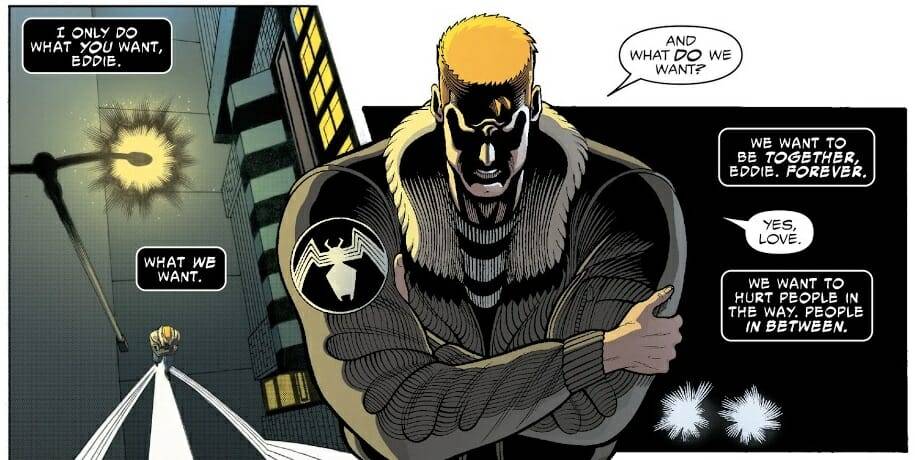
I’ve discussed Eddie Brock’s origin at length already but for the sake of the uninitiated let’s provide some context.
Eddie Brock was a reporter for the Daily Globe and (according to him anyway) a respected one at that. One day Emil Gregg a man of faith who like Brock seemed to be Catholic contacted him. Gregg claimed to be the then recent religiously motivated serial killer known as the Sin-Eater.
In reality, Gregg was a mentally ill person who had the misfortune of living next door to the real Sin-Eater, police detective Stan Carter. Carter recorded a voice journal and so when Gregg heard Carter through his bedroom wall he believed the ‘voices’ to be inside his head, becoming convinced that he was in fact the real Sin-Eater.
Gregg confessed his believed guilt to Brock who wrote up a sympathetic article (or several) that became incredibly attention grabbing. Initially refusing to give up his source Brock eventually became pressured into doing so, writing a sensational article unveiling ‘the truth’. Mere hours later though, the real Sin-Eater was apprehended by Spider-Man leading Brock to be fired. He was reduced to eking out a meagre and lonely living by writing ‘venomous’ articles about scandals, alien abductions, etc. for rag publications.
Brock blamed Spider-Man for his misfortune and whilst obsessively exercising to relieve his stress, he envisioned murdering the wall-crawler. Things got so bad for Brock he seriously considered suicide, but his Catholic upbringing meant he couldn’t go through with it. Instead he prayed for salvation in a church. Coincidentally this was the same church that Spider-Man had rid himself of an alien symbiote he’d believed to be his new black costume. The symbiote sensed Brock’s feelings and bonded with him, sharing Brock’s hatred of Spider-Man. To Brock this was a form of salvation and the two became Venom, dedicated to avenging themselves on Spider-Man.
Much later, after several encounters with Venom, Peter Parker met Brock’s ex-wife Ann Weying who elaborated further on Brock’s life. As she explained it Brock worked so hard to be a star reporter because his father, Carl Brock, seemed to have little use for him. When Brock’s career fell apart it destroyed his already bad relationship with his father. Ann claimed that this in turn drove Brock to madness and they soon divorced after that.
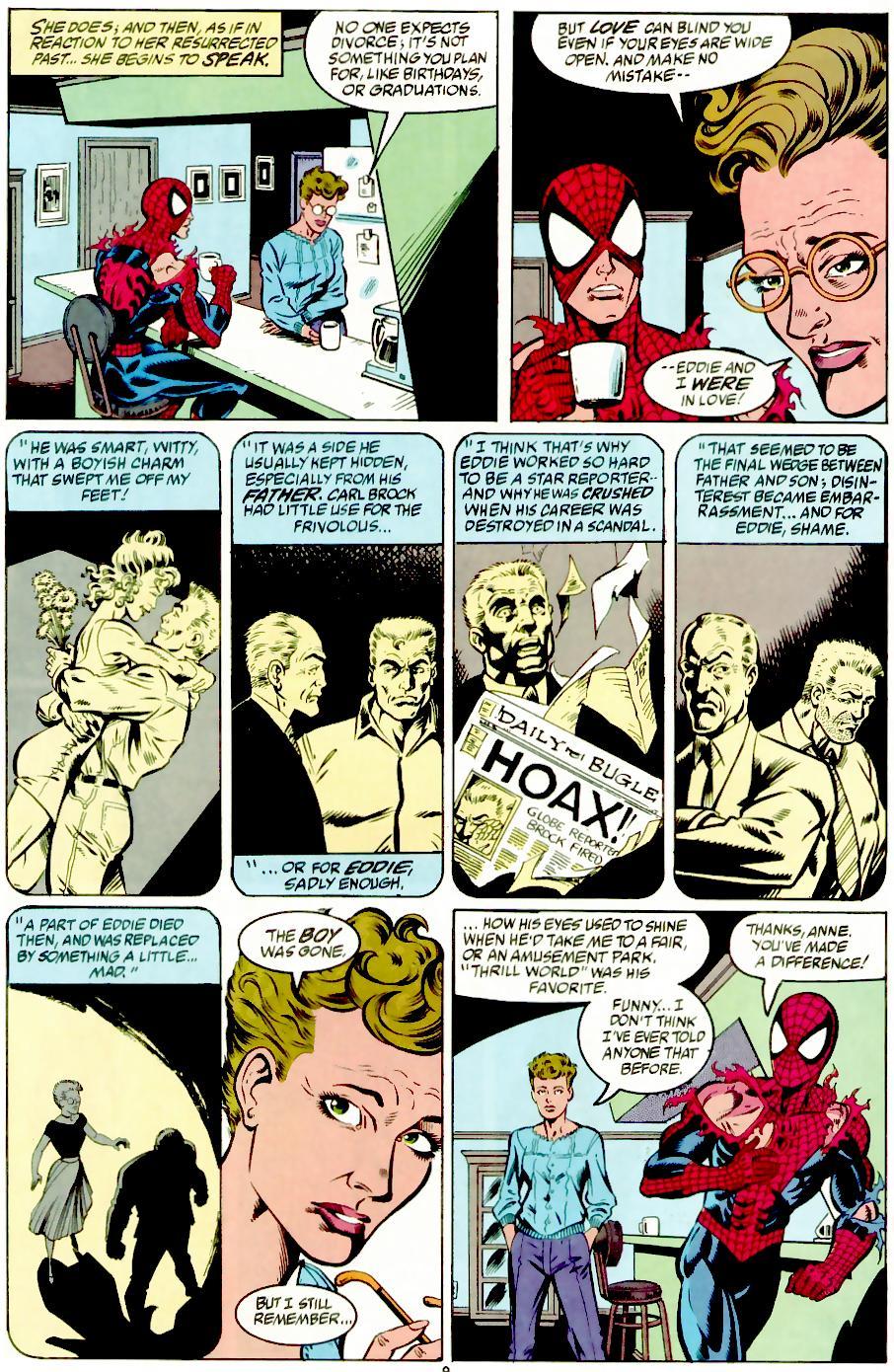
We get similar, yet deeper information in Venom: Lethal Protector #3, when Carl Brock’s elderly housekeeper relayed the story of Brock’s life. According to her Carl Brock was an already emotionally repressed man, but his wife (Jamie) was his world. When Jamie died giving birth to Eddie whatever so too did Carl’s ability to love. Thus young Eddie Brock grew up with no affection and little attention from his father.
This drove Eddie to excel in education, sports, etc. but each achievement failed to garner the affection and attention he craved from his father. This quest for his father’s love led to him becoming a crusading reporter. But even when his sensational Sin-Eater articles were being published, his father gave him little attention. As mentioned when Gregg was exposed as fake, that ended Eddie’s relationship with his father altogether.
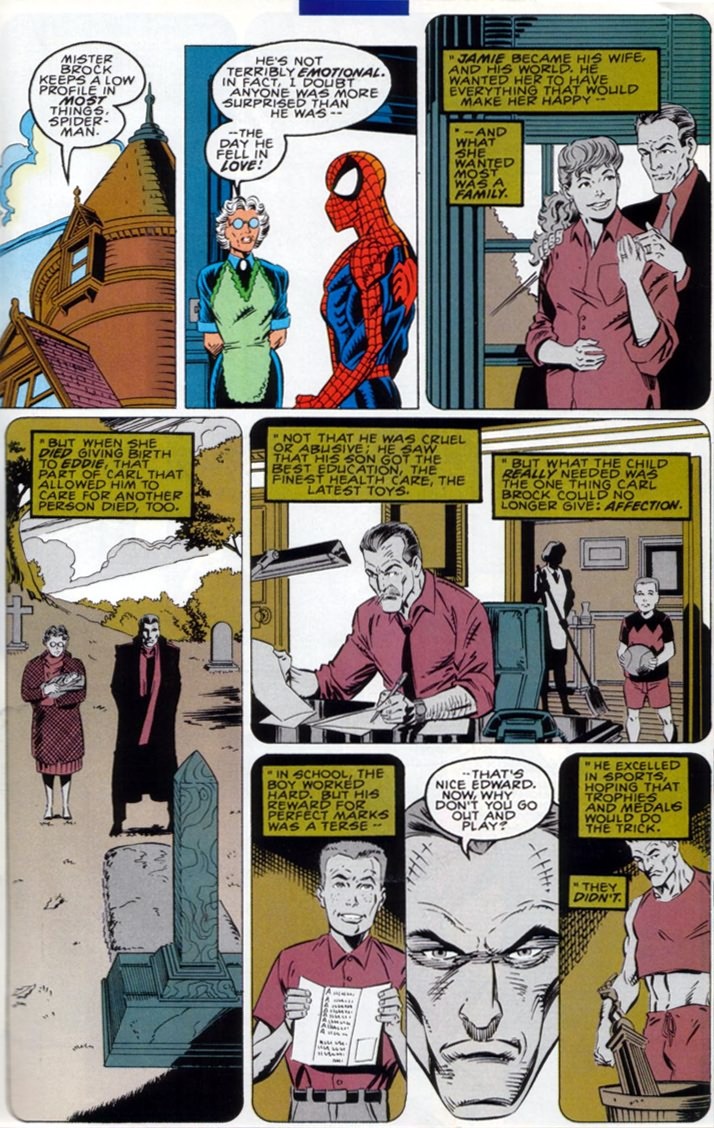
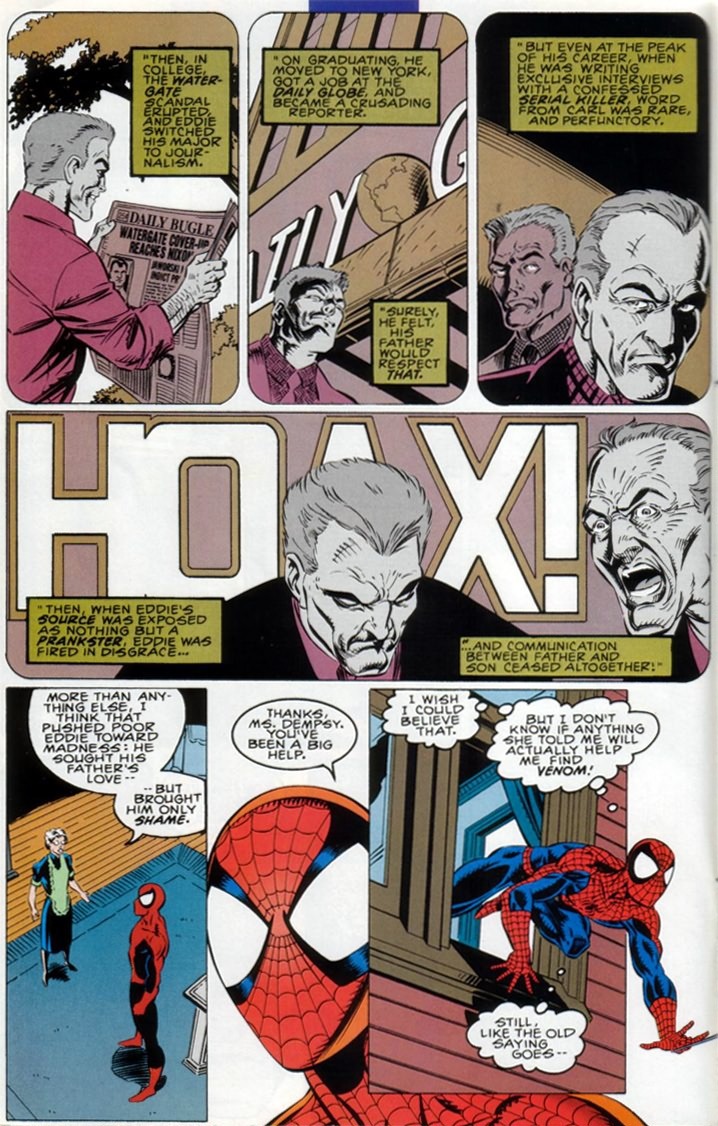
ASM #375 and Venom: Lethal Protector #3 clearly frame Brock’s origin sympathetically. This makes sense as both issues were laying the foundation for Venom’s solo-stories where he was to be an anti-hero. In this sense they seriously contradict the decidedly more villainous backstory he had in ASM #300.
In spite of the contradiction in tone and intent, the former and the latter don’t actually contradict one another in the details. Nothing established in ASM #300 is irreconcilable with the events of ASM #375/LP #3.
The latter in particular provides an intriguing insight into earlier and later portrayals of Brock/Venom.
As was made clear, the defining motivation for Brock before he became Venom was all about his father. He had grown up devoid of his father’s affections and has spent his life fruitlessly chasing them.
On the one hand this was more than likely to screw anyone up to some degree. But for Brock he practically hinged his whole career path on something that would impress his father. This is an idea expanded upon in Venom: Dark Origin #1. In the issue Carl suggested that Eddie become a reporter and expresses a respect towards seeking the truth.*

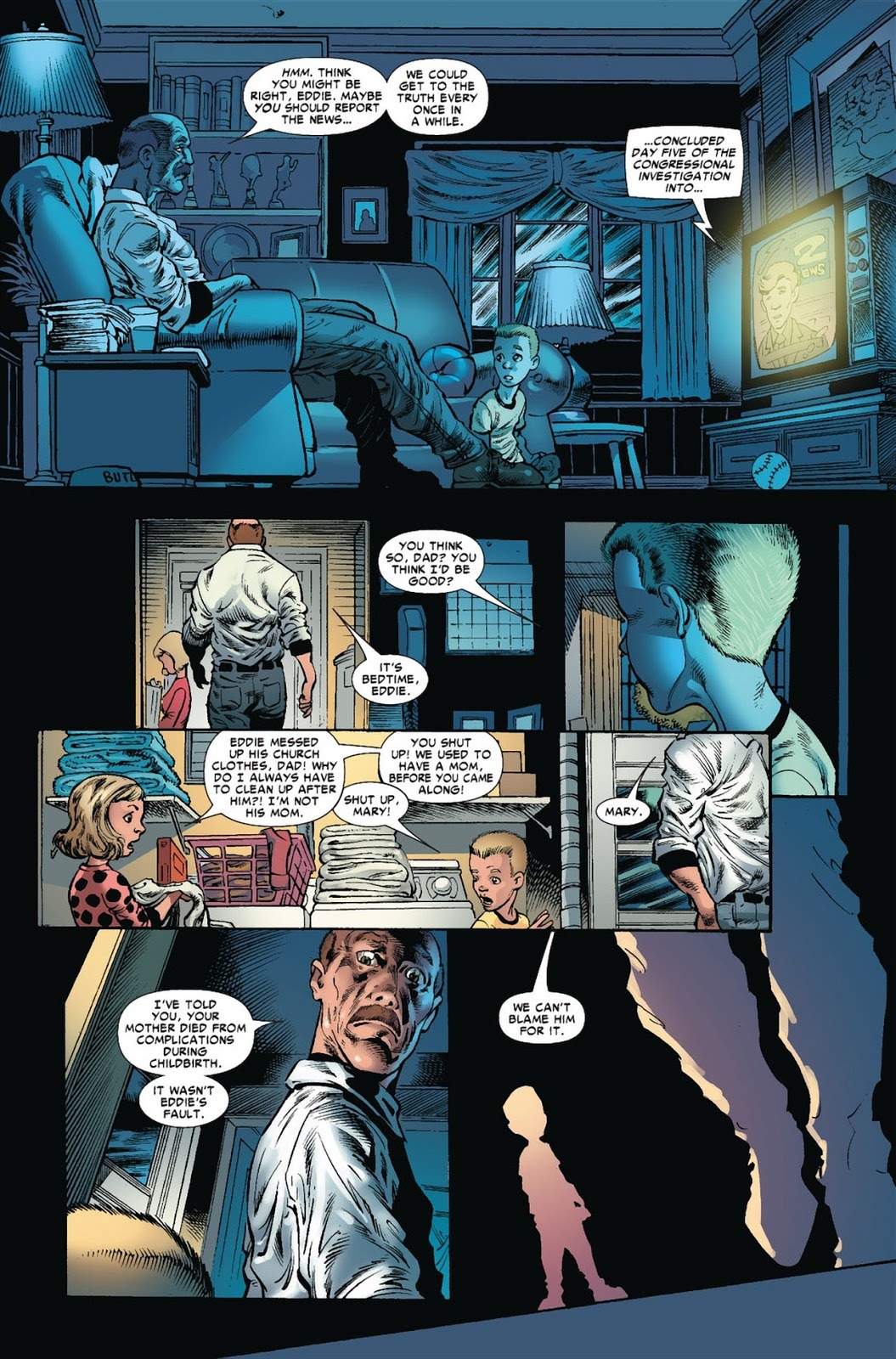
The stories don’t confirm this but it’d make an awful lot sense that Brock’s desire for affection was what prompted his actions regarding Emil Gregg?
Brock was highly unethical in protecting Gregg if he believed him to truly be the Sin-Eater. And his lack of fact checking was just plain sloppy. But in the context of his relationship with his father it makes a lot of sense.
Gregg’s confessions were obviously going to be attention grabbing; especially if Brock framed them sympathetically. And from Brock’s POV helping catch the Sin-Eater would finally earn his father’s affection. Additionally, it’s not uncommon for people in Brock’s situation to desire attention more generally, not just from specific individuals. So the Sin-Eater story would’ve been great fuel for Brock’s self-esteem regardless.
It’s not hard to believe he was in fact so emotionally desperate for attention/affection that he didn’t care about ignoring ethics or common sense practices. If he was that desperate, his descent into madness also makes a lot of sense. He wanted affectionate attention, and most of all he wanted it from his father. But his actions resulted in him being isolated from the career he loved, reduced to work that garnered little-no attention/affection and forever ended any hope of getting what he wanted from his father.**
Then on top of that he lost his wife. Divorce is often a horrible experience in general, but when you are already at that low point it’d hit all the harder. It’d hit harder still if you were someone who’d grown up neglected, lonely and craving affection.
It’s easy to argue Brock’s fixation upon Spider-Man was simply a mental reflex against the hard fact that he’d so thoroughly ruined his own life. That his actions forever destroyed any hope he had of getting the one thing he wanted, and then also wrecked the other good things he had accomplished.
But why Spider-Man in particular?
I think this again comes back to the issue of being attention grabbing.
Brock wanted to be noticed and in particular loved.
Spider-Man might have had a questionable public reputation but he was undeniably attention grabbing. He was frequently in the news (the field Brock loved being a part of before losing it) and, unless Brock cut himself off from all news sources, it would’ve been impossible for him to avoid seeing Spider-Man. Not only would this have reminded him of his own downfall, but there might’ve also been resentment over the fact that Spider-Man was getting so much attention when he was basically getting
Compounding things is the fact that Spider-Man wasn’t universally hated. There were those who openly regarded him as a hero. I think that’s why in ASM #300 there is that scene where a clearly unhappy Brock observes Spidey on the TV with the word ‘hero’ above him.
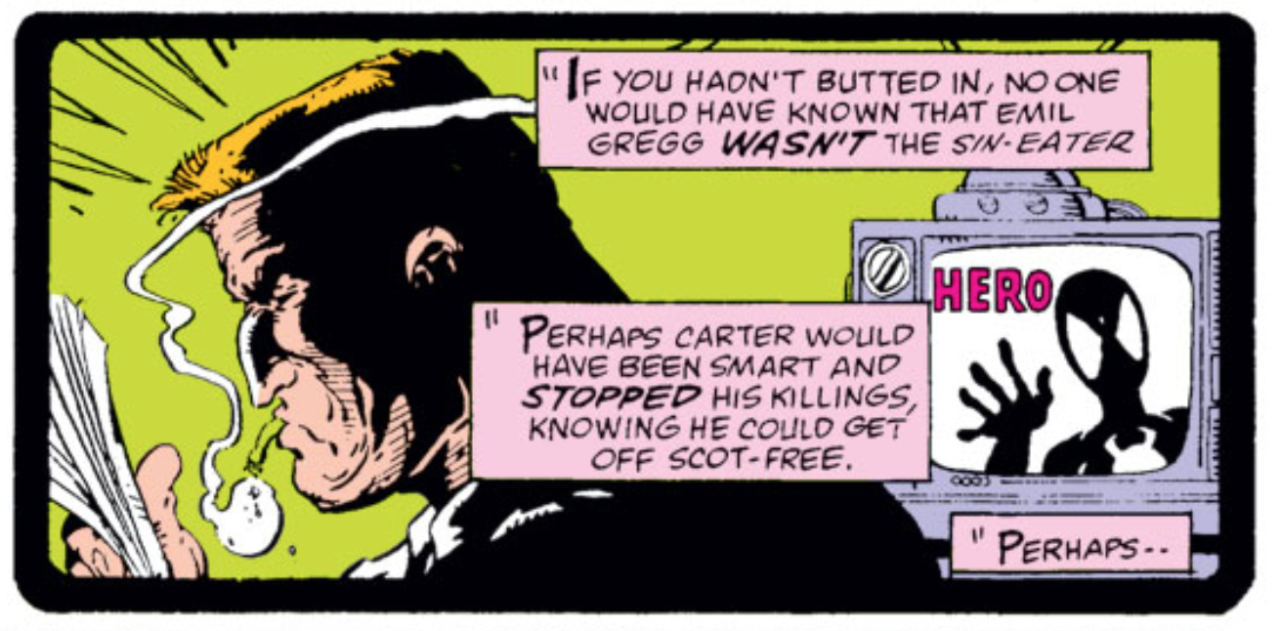
Spidey was getting attention and some affection from hundreds of people whilst Brock was getting zilch.
This resentment might’ve then grown into a hatred, a hatred Brock rationalized as the result of Spidey being responsible for ruining him, an appealing lie to tell himself and it absolves him of all blame.***
Brock’s religious background might’ve also fuelled his delusions. He was accustomed to taking things ‘on faith’ and ignoring contradictions to arrive at a truth he was comfortable with. Thus knowing the facts (that he ruined himself) became easy for his fragile mind to reframe as ‘I made a mistake but Spider-Man is at fault’.
Finally, growing up without a mother and little affection/attention from his father would naturally mean Brock had a certain sense of loneliness ingrained into him. Obviously this would’ve been seriously exacerbated when Ann left.
This could further explain the powerful connection he forged with the symbiote.
The symbiote was a life form that literally relied upon being with others. Loneliness will eventually kill it.
Like Brock it craved affection, a fact that rendered it a pariah amongst it’s own kind. This is not dissimilar to how Brock found himself ostracised in the field of journalism. Both he and the symbiote were cast out for ‘unethical practices’ if you will.
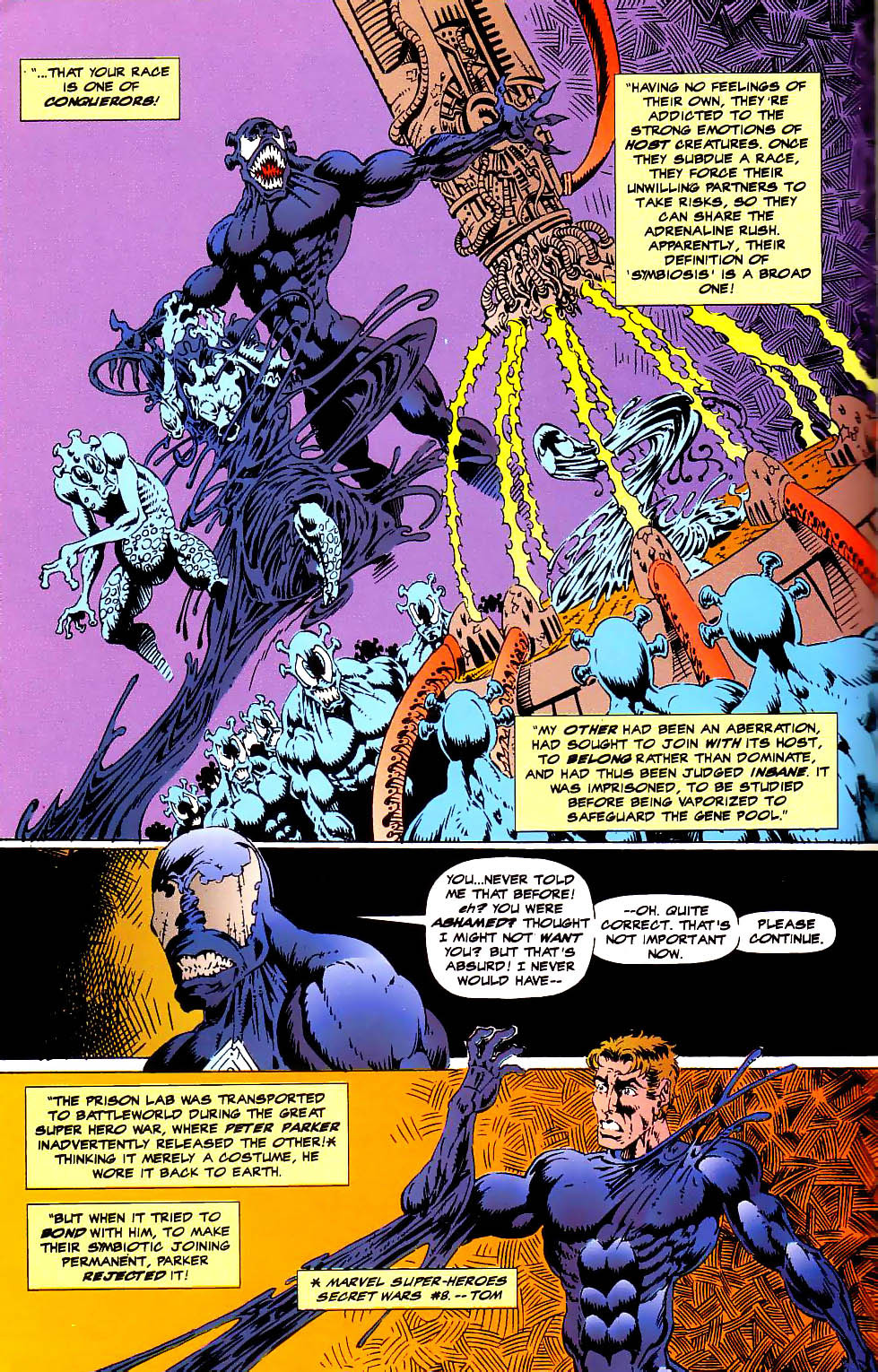
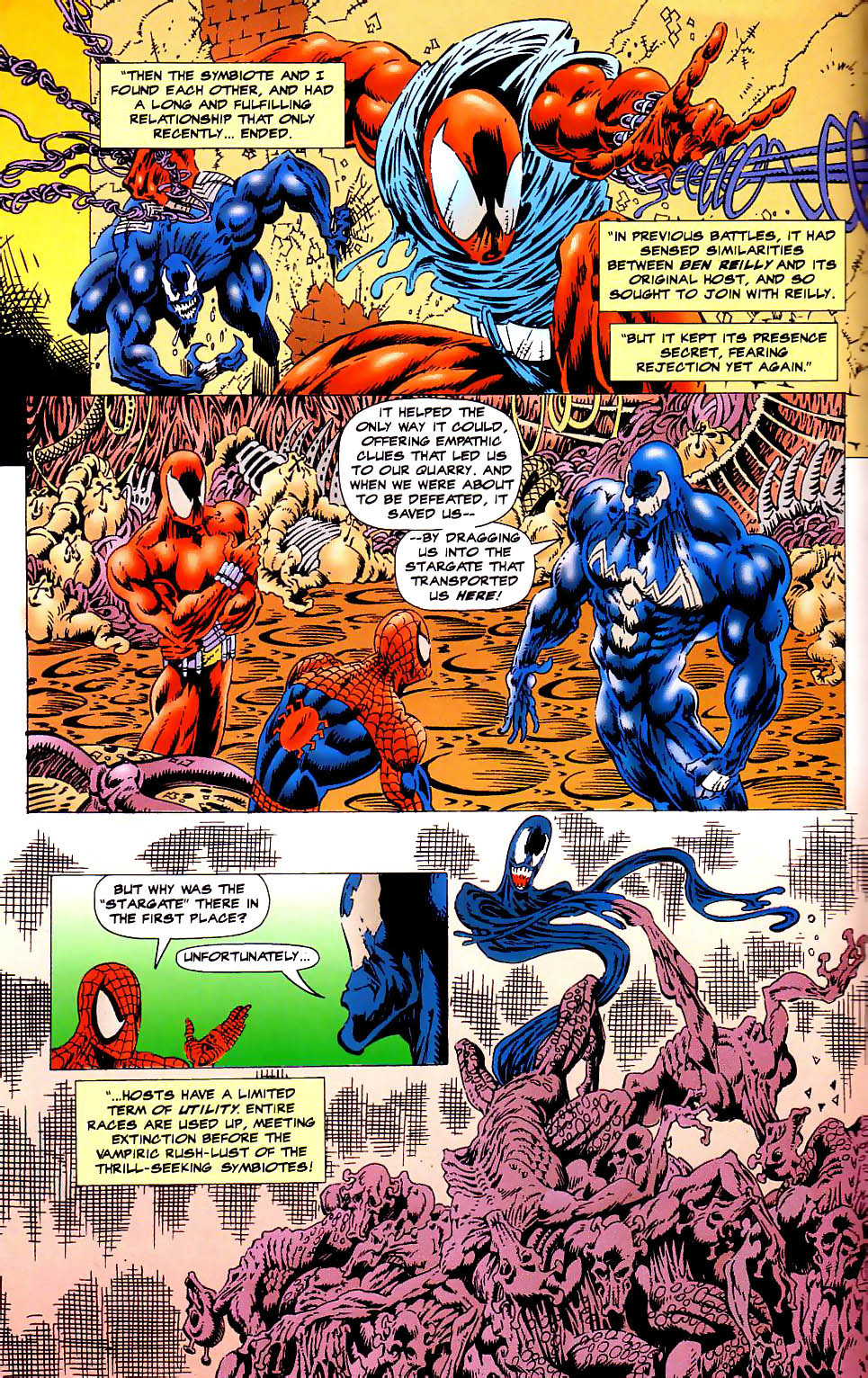
Finally, when the symbiote met Brock they’d both been rejected by the people they loved and wanted to be wiFor Brock that was Ann and Carl, for the symbiote it was Spider-Man/Peter Parker.
In one another they found kindred spirits. Two lonely individuals, desperate for affection, but rejected by ‘their kind’ and, more specifically, by the individuals they craved it most from. These circumstances had rendered both physically and mentally unhealthy.
It was during their respective lowest points that they found a kind of toxic salvation in one another.
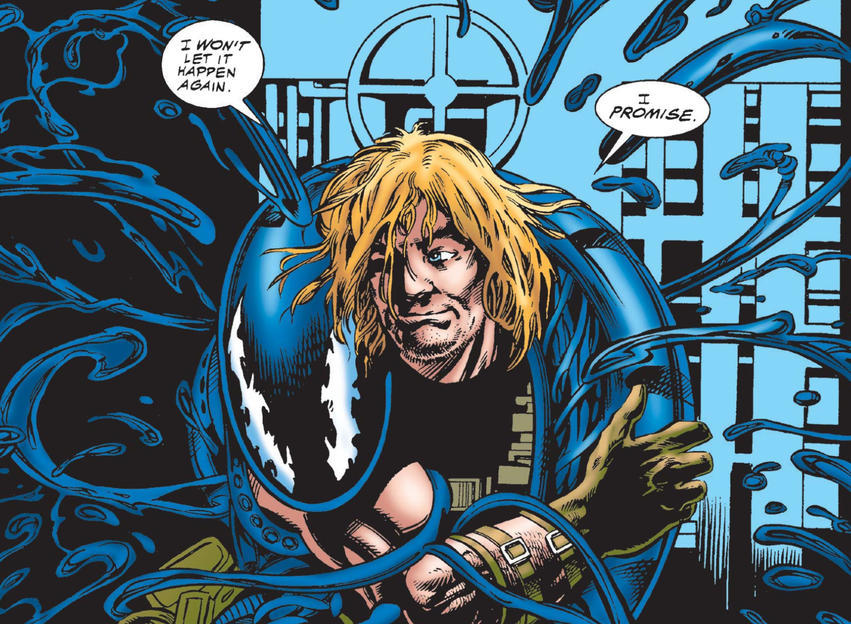
Perhaps this is part of why they re-christened themselves Venom.
*Dark Origin is a story that overwrites and contradicts older Venom stories but also plays with many concepts from them too. Author Zeb Wells was certainly riffing and extrapolating from pre-existing Venom stories
It’s canonicity can be debated but it’s at least food for thought going forward.
**Although ironically they were designed with that intent as they were scandal rags. Maybe ‘attention’ was a baked in theme for Brock’s character?
***Let’s also consider that as a journalist spinning a certain story would come naturally to Brock.


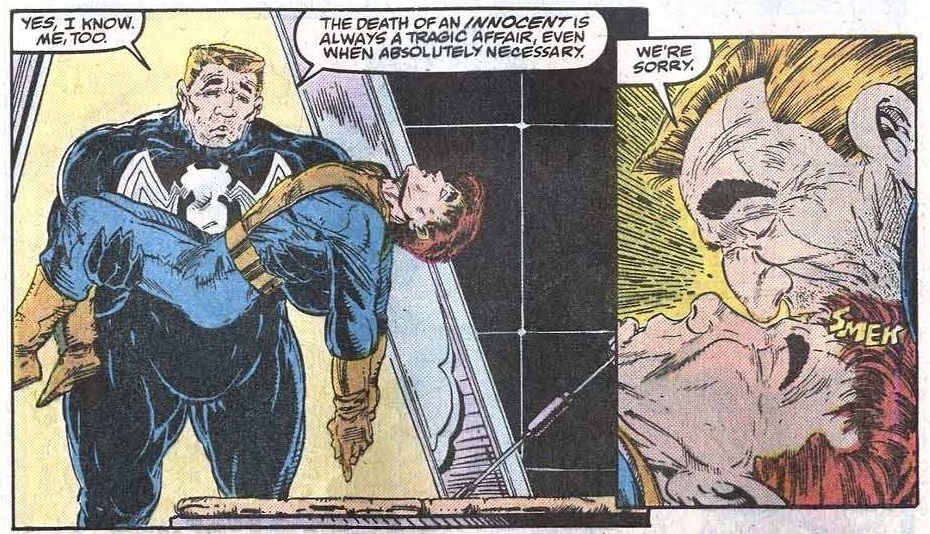






I choose to ignore Emily Osborn showing up in ASM #800 and pretend it never happened, as it goes against decades of Norman/Harry history.
@Hornacek
IIRC in the original Michelinie stories Carl didn’t exactly blame Eddie per se, but that was the implication in Dark origin. It was more that he was an unemotional man with one exception and then that exception died making him a lost cause incapable of giving his son the affection he needed.
Emily is a confusing situation, even before Slott randomly decided she had never actually died. IIRC whilst she was presumed or stated to be dead by the time Peter met Harry the specifics were never touched upon until ‘The Child Within’ in the 1990s. In that story we find out Harry did enjoy a few years with his mother and there are even photos to prove it, so those memories aren’t a product of delusion or anything. However, in ‘Revenge of the Green Goblin’ by Stern he either heavily implied or outright stated Emily died giving birth to Harry. Either way I do remember that she was shown to be dead or dying when Harry was a babe in arms.
The caveat to that though is that the scene was simply Norman’s flashback and as we know from ASM #40, there is the truth and then there is how Norman chooses to remember things. So it’s possible that Norman’s twisted mind was altering the facts (this was shortly after he went further over the edge due to the Gathering of Five ceremony). Alternatively he might’ve only been slightly misremembering things and Emily died a few years after giving birth due to complications caused by her pregnancy, thus making Norman’s blaming of Harry still possible.
As for real life events, even in the 2000s, Marvel were still tying things specifically to real world events. In fact Peter David did it a few years ago in his 2099 run where villainess Gloriana’s motivations are tied directly to 9/11. Even when addressing the problem Marvel usually just kicks the can down the street. Greg Rucka retconned Punisher as a Vietnam vet by updating his service to a more recent war in the Middle East. Extremis updated Iron Man’s time in Vietnam to Afghanistan. And in Heroes Reborn Ben Grimm was updated from a WWII pilot into a Korean War pilot as I recall.
Mark Waid (with credit to Kurt Busiek) recently implemented a better solution in his History of the Marvel Universe mini-series by establishing the ‘Sian-Cong War’ which acts as a stand-in for the Vietnam War (and possibly other wars in that region of the world, like Korea). So from now on Marvel are treating Iron Man, War Machine and Punisher’s origins as occurring in the Sian-Cong War.
Of course I don’t like either solution as I feel characters should be allowed to (gracefully) age anyway.
“Then in college, the Watergate scandal erupted and Eddie switched his major to journalism.”
It seems strange that Marvel would link Eddie’s origin to a real world event with a fixed date like this. This would make Eddie almost 70 years old now.
It’s like how Stan originally had Flash go to Vietnam, but subsequent retellings of his “origin” have updated that to him just serving in the military “overseas”. In Stan’s defense Marvel at the time was still figuring out that these characters could be around for decades so setting their origin in a specific year was not a good idea. But by the time we got to Eddie’s origin this was common knowledge in the comics industry.
“Carl Brock was an already emotionally repressed man, but his wife (Jamie) was his world. When Jamie died giving birth to Eddie whatever so too did Carl’s ability to love.”
Just for once I’d like a comicbook character (hero or villain) whose mother died giving birth to them, but their father did not blame them for it and was a good and loving parent. It’s probably happened and I just can’t remember an example off the top of my head, but when I read this I immediately thought of Harry and Norman either blaming Harry for Emily’s death or refusing to show him normal affection (although I don’t think it’s ever been 100% confirmed that Emily died giving birth to Harry, but this seems to be the common theory).